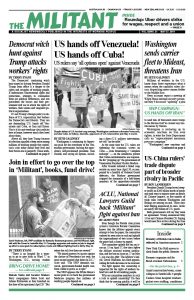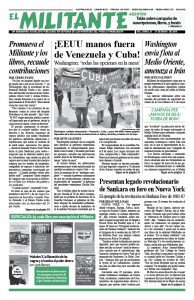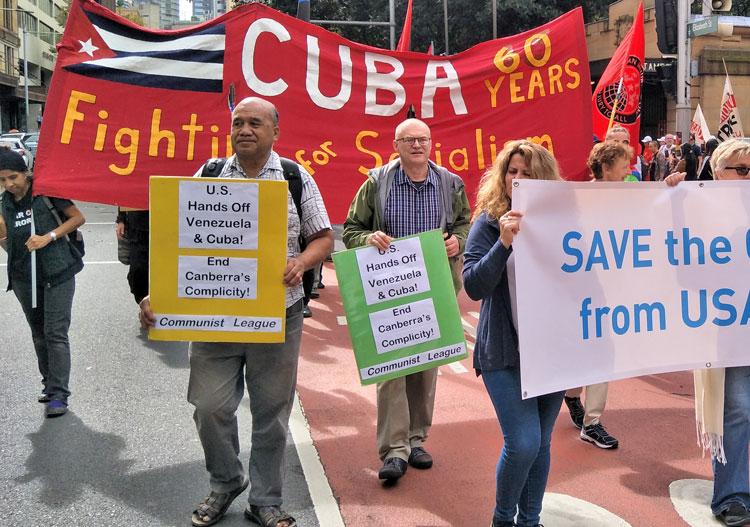Washington is continuing its bipartisan push for the overthrow of the Venezuelan government, backing the opposition’s self-proclaimed president, Juan Guaidó, and saying all options, including a direct U.S. military intervention, are still “on the table.”
At the same time the U.S. rulers are tightening the economic screws on Cuba — even threatening a “complete embargo” — on the slanderous pretext that Cuban revolutionaries are responsible for “propping up” the government of Venezuelan President Nicolás Maduro.
After Guaidó initiated a failed coup outside an army base April 30, accompanied by a handful of National Guard defectors, the Maduro government stripped the immunity of a half-dozen members of the opposition-controlled National Assembly accused of joining the conspiracy.
National Assembly Vice President Edgar Zambrano was arrested May 8. Charges include treason, conspiracy, civil rebellion, criminal association and “continued hatred.” At least one other deputy sought refuge in the Argentine Embassy in Caracas to avoid arrest. But the government has so far not attempted to detain Guaidó.
Maduro issued a presidential decree demoting and expelling 55 armed forces officials accused of taking part in the coup attempt, including Division Gen. Manuel Christopher Figuera, chief of the SEBIN intelligence agency, and National Guard Lt. Col. Ilich Sánchez. He was filmed with Guaidó April 30 calling on other soldiers to “come join us.”
Imperialism’s crocodile tears
U.S. officials have been crying crocodile tears for the people of Venezuela, who face the impact of the deep capitalist economic and social crisis. Washington hoped that the shortage of affordable food, lack of medicine, violent crime, skyrocketing inflation and frequent power outages would drive working people into the pro-imperialist opposition’s arms.
While the support for the Maduro government has fallen substantially, most working people remain suspicious of Guaidó and his gang. They know that the opposition forces defend the interests of the capitalist class and U.S. imperialism. And that U.S. sanctions and intervention make the crisis they face worse.
Guaidó told the Italian daily La Stampa May 10 that “if the Americans were to propose a military intervention I would probably accept it.” But even many Guaidó supporters oppose a U.S. invasion. “That would spark a civil war,” law student Pasqual Paulino told the Washington Post at a protest in Caracas May 2.
US invents 20,000 Cuban troops
White House officials try to justify their stepped-up threats against Cuba with the slanderous charge that Cuba has 20,000 armed soldiers in Venezuela.
The liberal Washington Post, which shares the Democrats’ and Republicans’ hostility toward both Venezuela and Cuba, admitted May 2 that it’s just not possible to “hide 20,000 to 25,000 [Cuban] soldiers.” In fact, the Cuban volunteers are overwhelmingly doctors and nurses, as well as a smaller number of teachers and sports or dance instructors.
Vice President Mike Pence insisted May 7 that “Cuban agents” control the “military and intelligence services” and that “key decisions about Venezuela’s future are as much made in Havana as they are in Caracas.”
The purpose of these slanders and outright lies is to justify U.S. imperialist violation of Venezuelan sovereignty and the escalation of the decadeslong U.S. economic war against the Cuban Revolution.
Their threats and preparations are deadly serious. After the coup attempt failed, “U.S. officials have since been more cautious in their predictions of Maduro’s swift exit,” the Washington Post reported May 8. You can be sure they will keep pushing.
Sanctions tightened on Cuba
The U.S. government has begun implementing its latest round of anti-Cuba sanctions, announced April 17, including allowing Title III of the 1996 Helms-Burton Act to go into effect for the first time.
Title III allows U.S. citizens to sue for compensation from any company or individual that profits from the use of “their” property that was nationalized during the early years of the revolution.
U.S. citizens filed suit May 2 against Carnival Corp., on the grounds that the cruise operator was embarking and disembarking passengers on port facilities and waterfront property that their families owned at the time of the revolution.
ExxonMobil Corp. sued two Cuban companies May 2 over oil refineries and service stations nationalized by the revolution in 1960. The oil barons are demanding some $280 million.
The U.S. moves are aimed at exacerbating the economic challenges in Cuba. On May 10 Cuba’s domestic commerce department announced it was rationing eggs, rice, beans and sausages and that state-run stores would also get enough chicken for the public before it can be sold wholesale.
“This is the right response,” Cuban tobacco factory worker Lazara García told The Associated Press. “Without this, there’ll be hoarders.”
In a May 2 statement, Alyson Kennedy, Socialist Workers Party candidate for mayor in Dallas, noted that the threats against Venezuela and Cuba “are bipartisan, with Nancy Pelosi, Joe Biden and many other leading Democratic Party voices joining in the warlike drumbeat.”
She called on working people to demand “an immediate halt to Washington’s dangerous violations of Venezuela’s sovereignty and war threats against the Cuban Revolution.”
“Only the people of Venezuela have the right to decide their own future,” Kennedy added. She issued a call to action, urging working people to speak out and say, “U.S. hands off Venezuela! U.S. hands off Cuba!”


